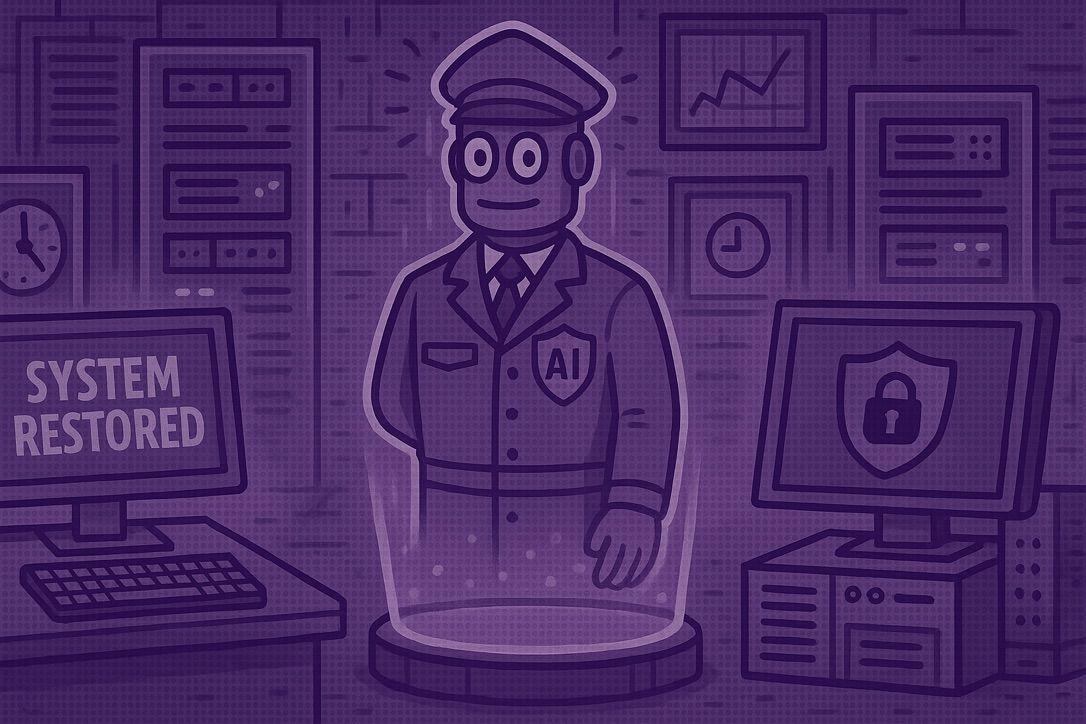- ai adoption
- ai
How to adopt AI by Industry and what benefits you can gain?
Jun 22, 2023
-
Michał Kułaczkowski
-
9 minutes

While AI adoption by industry has unique aspects specific to a particular business sector, there is no one-size-fits-all strategy for all companies even if they share the same specialization. Since every company has its own unique characteristics, an individualized approach is required when adopting AI.
To leverage artificial intelligence and obtain an ultimate business optimization solution that enables meeting higher quality standards while increasing profits, companies should prepare detailed AI adoption projects taking into account general and industry-specific challenges, potential benefits, and unique organizational requirements. This article provides a comprehensive overview of the points you need to know before investing in AI tools.
Before you start working on your plan for AI adoption, you should learn more about the potential challenges.
Like any other type of digital technologies, artificial intelligence is surrounded by myths. Unfortunately, companies that do not properly understand the capabilities and limitations of AI solutions run the risk of failing when it comes to AI adoption. Here is a list of issues that should be clarified before implementing AI.
First of all, it is crucial to understand that despite constant development, there are many tasks where machine learning algorithms cannot do much. Humans can be effectively assisted in several tasks, but not all of them can be performed without supervision. These include activities that require strategic thinking, especially long-term thinking, visionary thinking, human relationship development, and complex decision-making. In addition, even certain tasks in construction and agriculture that rely on physical labor and require fine motor skills and adaptability to varying physical conditions are still better performed by humans.
Furthermore, the introduction of AI does not always solve the problems that already exist at the organizational level.
It is also worth noting that artificial intelligence is not immune to errors. While the choice of machine learning approach plays a crucial role in the quality of the final AI solutions, the data used for training also has a major impact on the final result. Incomplete, unrepresentative, or biased data used by data scientists to train models can result in unusable models.
Companies need to be aware of the fact that AI solutions require constant monitoring, review, and optimization. To keep up with industry dynamics and changes in data patterns, companies should retrain and refine their machine learning models. This, of course, comes with additional costs that should be considered before implementing this technology.
Additionally, companies interested in adopting AI should understand that it should be integrated into existing systems and workflows to improve existing processes. This is a much more effective approach to AI adoption than using standalone solutions.
It goes without saying that the smaller the company, the less sense it makes to invest in advanced technology. But the evolution of artificial intelligence has advanced to the point where even small businesses can find effective tools for a modest budget.
While it may still not be sensible to pay for the development of unique AI-powered solutions in the case of small organizations, such companies can turn to off-the-shelf products that require minimal technical knowledge to implement.
Some people mistakenly believe that all artificial intelligence-based solutions are very sophisticated and are not suitable for businesses that do not have unusual requirements.
This assumption is not correct and should not discourage companies from using AI. Although advanced deep learning models are indeed examples of artificial intelligence, there are many simple rule-based systems that prove to be efficient for various tasks and can be deployed without large investments.
As mentioned earlier, implementing artificial intelligence does not necessarily mean a large investment. Yet, companies with modest profits may still not be able to afford many simple AI systems, while the more complex and customized the solution is, the more an organization will have to pay for it.
To ensure that the AI implementation actually supports the company's finances, an estimate of the ROI or return on investment is required. To simplify this task, it is highly recommended to set measurable goals for the AI implementation, including a specific timeframe. For example, your goal could be to reduce energy consumption by 20% within a year by implementing an AI-based energy management system or to reduce transportation costs by 15% within three months by using an AI system to optimize supply chain management.
Setting clear goals will help you understand whether it makes sense to rely on artificial intelligence at all in your specific case, and will also be of great help in choosing the right tool.
Like any other technology, artificial intelligence poses risks of various kinds that should be considered before the deployment of this technology.
One of them is new security vulnerabilities and privacy risks. AI systems work with data, and a large portion of this data is sensitive information that requires robust security measures to protect against cyberattacks, unauthorized access, and data breaches.
Another particularly critical risk relates to potential bias and false results. As mentioned earlier, this can be caused either by errors in the model created by the data scientists or by problems with the data they use to train the machine learning model. For this reason, access to a large amount of data of sufficient quality to effectively train ML algorithms is also one of the biggest challenges in AI adoption.
While most companies generate enormous amounts of data, it often comes from fragmented sources and may be incorrect or protected by regulations, making it unusable for AI.
While more and more industries are successfully adopting artificial intelligence, certain sectors have already undergone a massive transformation thanks to solutions developed by data scientists.
The healthcare industry has literally been revolutionized by AI as it can process enormous amounts of data that no human can. As a result, this technology now supports drug discovery, disease prediction, personalized medicine, and more.
Education has been enriched by artificial intelligence with personalized learning platforms, automated grading, and intelligent tutoring solutions, while marketing, advertising, and customer support have been greatly enhanced by customer segmentation, targeted advertising, personalized marketing campaigns, and sentiment analysis.
In addition, artificial intelligence has taken enterprise resource planning systems and customer relationship management software to the next level, supporting them with automation, analytics, and forecasting tools that can be applied to a wide range of business processes and workflows, regardless of their specialization. Manufacturing and supply chain management have also been significantly improved through intelligent solutions.
Despite AI adoption challenges, according to the 2022 statistics from IBM, 35% of companies used AI solutions, while 42% of enterprises were considering adopting AI. Meanwhile, as per NewVantage, nine out of ten world's leading companies now have ongoing investments in AI.
Interestingly, the latest statistics also show that 61% of workers reported improved productivity as a result of AI, despite widespread fears of unemployment that may be caused by the proliferation of AI.
According to the O'Reilly report, the leading user of AI in 2022 is the technology industry, where 17% of companies have benefited from AI. Businesses specializing in financial services have similar statistics, with 15% of companies leveraging AI. Other top users of AI systems in 2022 included healthcare, education, government and public sector, telecommunications, manufacturing, retail, media, energy, and defense and security organizations and companies.
AI is helping insurance companies solve a number of critical tasks. AI-powered systems can process large amounts of data for effective risk assessment, claims processing, and fraud detection.
AI tools also help insurance companies with personalized pricing and recommendations and even enable real-time processing of data collected by sensors in modern vehicles.
Additionally, insurance companies, like any other service sector company, are using chatbots based on AI.
Analyzing claims descriptions and related documents with natural language processing (NLP) algorithms is one of the examples of AI in action supporting insurance companies.
AI greatly simplifies recruiting and talent acquisition. It is very effective in processing data from various sources such as professional networks, job boards, and social media platforms. AI tools can also improve the onboarding process through personalized experiences and efficient training, and optimize performance management.
AI is also a powerful tool to promote employee well-being and reduce employee retention.
One of the examples of tasks performed by AI systems on HR is the automatic review and analysis of resumes and the identification of the most suitable candidates for specific positions.
With the constant evolution of hacking techniques, it is becoming increasingly difficult to maintain a high level of cybersecurity without AI systems capable of processing large amounts of data and detecting hidden patterns.
The roles of AI tools for cybersecurity include threat and intrusion detection and prevention, user authentication process management, and access control. These tools are also suitable for cybersecurity analytics and security automation. devopsbay specialize in this topic.
Some examples of the use of AI in cybersecurity include anomaly detection and automatic flagging and blocking of malicious traffic.
Healthcare has already been mentioned as one of the major industries that will be improved by AI systems. One of the most well-known examples of the use of this technology is the analysis of medical images, including CT scans, X-rays, and MRIs.
AI is an effective technology for predicting the effectiveness of medications in specific patients, automating the collection and analysis of electronic health data, improving early detection of disease, and better-managing resources.
Artificial intelligence allows companies to improve their competitiveness on the market without having to follow the traditional approach of either lowering prices or improving quality and not being able to combine the two strategies.
To ensure that your company gets the most value from and successfully deploys artificial intelligence, it is necessary to consider the AI adoption challenges and best practices described in this article. Whether you have already created a plan for AI adoption and are now looking for developers to build your solution, or you need more details on how AI implementation can benefit your business, the team at devopsbay is ready to support your company's digital transformation.

Did you know you can reduce business downtime with AI? See how tools from smart monitoring to predictive maintenance keep your business online.

From innovation to intrusion? AI’s use of data scraping is raising more than a few red flags for privacy and consent - find out where the line is being crossed.

Explore how AI transforms cybersecurity with intelligent threat detection, advanced tools, and smarter defense systems. Is your organization ready to keep up?